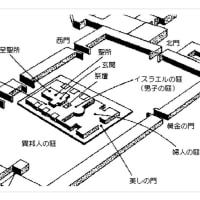マルコの福音書6章 信仰の追試験
1.郷里ナザレでの出来事(1:1-13)
マルコが描く舞台は、ヨルダン(1章)からカペナウム(2-4章)、ゲラサ人の地(5章)、そしてイエスの故郷のナザレへと移っていきます。そしてナザレでの出来事。幼い頃からイエスをよく知っていたナザレの人々は、イエスについては複雑な感情を抱いていたようです。彼らは、イエスを預言者として、さらには神としてなど、とうてい認めることができずにいました。
イエスが宣教の旅に出て、郷里に戻ったのは、これが二度目、約1年後のことです(ルカ4:16-30)。一度目の時は、郷里の人々は、イエスのことばに激怒し、丘の崖っぷちまで追い詰め、そこから突き落とそうとしました。二度目の今回は、イエスが他の地域でなさった様々な噂も耳にしていたのでしょう。彼らは一応イエスの話に耳を傾けようとします。しかし、やはり、あいつはあの角の家?に住む、大工ヨセフのせがれではないか、と理性が邪魔をして、イエスを信じる気にはならないのです。
不思議なものです。もしイエスが、有力者のせがれであれば、違った対応になっていたかもしれません。あるいは、どこかで、大スターになって名をあげていたとすれば、村中こぞって歓迎したかもしれません。しかし、神はイエスを有力者のせがれにも、時の大スターとしても、登場させなかったのです。なぜ神は、ご自分の計画を成功させるために、もっと効果的な方法をとらなかったのか、と思うところです。しかしそれは、真に遜った人間を救いに導くための神の知恵であったと言うべきでしょう(ピリピ2:6,7)。
イエスはナザレの近くの村々を教えて回り、さらに十二弟子を派遣し、ご自身の働きを拡大されました。弟子たちは、汚れた霊を追い出し(7節)、悔い改めを説き(12節)、病人を癒したとあります(13節)。彼らは、耳を傾ける人に集中して福音を語るように勧められています。
2.ヨハネの死(6:14-29)
さてこのガリラヤ伝道において、イエスは初めてヘロデ王に知られるようになりました。17節から29節は、いわゆる挿入で、バプテスマのヨハネの逮捕とその処刑について記録しています。この時、ヘロデは、ヨハネを殺した呵責に苛まれていました。彼はヨハネを預言者として認め、喜んでその言葉に耳を傾けましたが、妻の悪だくみに引っかかって、不本意な形でヨハネを殺してしまうのです。人の心は複雑です。4章の種蒔きのたとえで言えば、ちょうど、彼こそが茨の地に蒔かれた種と同じような心を持った人というべきでしょう。こうして、彼もまた、ナザレの人と同様に、イエスの正体を正しく理解できなかった一人として、語られているのです。
3.五つのパンと二匹の魚、信仰の追試験(6:30-56)
さて、イエスと弟子たちは、ヨハネの悲報に心を痛め、その傷心を癒すため、静かな場所に退こうとしました。しかしイエスに助けを求める群衆は、そんなイエスの都合など考えません。彼らは、後から後から追いかけてきました。するとイエスは、彼らに苛立つどころか、むしろ「深くあわれんで」迎えられたとあります。まことの神の子イエスに、感傷に浸る一瞬の時は愚か、食事をとる間、息をつく暇もありませんでした。それでも、イエスは、人々の切実な心に向かわれたのです。イエスの人生は全く神のみこころに献げられていたと言うべきでしょう。献身者の鏡と思いつつ、なかなかそこまでは、しかし主よ、成長せてくださいと祈るところではないでしょうか。しかも45節、世の教師とは異なって、お弟子に心を配り、細々と動き回っているイエスが印象的です。サーバントリーダーシップとはまさにこういうものでしょう。上に立って口を動かしているのではなく、自ら手と足を動かすのです。そして続く嵐を静める奇跡は、4章に出て来たものと同じです。弟子たちにとっては追試験のようなものでした。ところが、弟子たちはまたもや落第点です!イエスを神と認めながら、その信仰を働かせることができませんでした。「しっかりしなさい。わたしだ。恐れることはない」というイエスのことばに自ら立ち、人も立たせられるようになったら信仰者として一人前でしょう。昨日の自分よりも今日の自分、信仰の修練の道を進ませていただきましょう。では今日もよき一日となるように祈ります。
Mark 6: A Further Test of Faith
1. the events in his hometown of Nazareth (1:1-13)
Mark's setting shifts from the Jordan (chapter 1) to Capernaum (chapters 2-4), to the land of the Gerasants (chapter 5), and then to Jesus' hometown of Nazareth. And then the events in Nazareth. The people of Nazareth, who had known Jesus well from childhood, apparently had mixed feelings about him. They could never recognize Jesus as a prophet or even as God.
This was the second time Jesus returned to his hometown after a missionary journey, about a year later (Luke 4:16-30). The first time, the people in his hometown were so enraged by Jesus' words that they drove him to the edge of a hill and tried to push him off. This second time, they had probably heard the rumors of what Jesus had done in other parts of the country. They try to listen to Jesus. But they still thought he was Joseph the carpenter who lived in the house on the corner. But they are not inclined to believe in Jesus, because their reason gets in the way.
It is a strange thing. If Jesus had been the son of an influential person, he might have responded differently. Or if he had become a big star somewhere and made a name for himself, the whole village might have welcomed him. But God did not make Jesus appear as the son of an influential person or as the biggest star of the time. One might wonder why God did not take a more effective way to make His plan work. But it should be said that it was God's wisdom to lead a truly compliant man to salvation (Philippians 2:6,7).
Jesus went around teaching the villages near Nazareth and even sent His twelve disciples to expand His ministry. The disciples cast out unclean spirits (v. 7), preached repentance (v. 12), and healed the sick (v. 13). They are encouraged to focus on those who will listen and speak the gospel.
2. the death of John (6:14-29)
Now in this Galilean mission, Jesus first became known to King Herod; verses 17-29 are so-called insertions, recording the arrest of John the Baptist and his execution. At this time, Herod was tormented by remorse for killing John. He recognized John as a prophet and was willing to listen to his words, but his wife's deception led him to kill John unwillingly. The human heart is complex, and in the parable of the sower in chapter 4, he is just the kind of man whose heart is like the seed sown on thorny ground. Thus, he is described as one who, like the man of Nazareth, failed to properly understand the identity of Jesus.
3. the five loaves and the two fish, the follow-up test of faith (6:30-56)
Now, Jesus and His disciples, pained by John's sad news, tried to retreat to a quiet place to heal their broken hearts. But the crowd seeking Jesus' help did not consider such convenience of Jesus. They followed him from one place to another. Jesus was not irritated, but rather "deeply compassionate" toward them. It was foolish for Jesus, the true Son of God, to have a moment of sentimentality, and there was no time to catch his breath while he ate his meal. And yet, Jesus was still directed to the desperate hearts of the people. I would say that Jesus' life was totally dedicated to the will of God. We think of him as a mirror of the devotee, but it is not so easy to go that far, but Lord, let me grow, we pray. Moreover, in verse 45, it is impressive that Jesus, unlike the teachers of the world, is attentive to his disciples and moves around in detail. This is exactly the kind of servant leadership, isn't it? Instead of standing on top and running his mouth, he moves his hands and feet. And the miracle of calming the storm that follows is the same as the one in chapter 4. It was like a follow-up test for the disciples. However, the disciples again fail! They recognized Jesus as God, but failed to put their faith to work. They were saying, "Pull yourself together. It is I. Don't be afraid. When you can stand on your own feet and let others stand on theirs, you will be a man of faith. Let us be better today than we were yesterday, and let us advance on the path of faith training. I pray that today will be another good day.
















